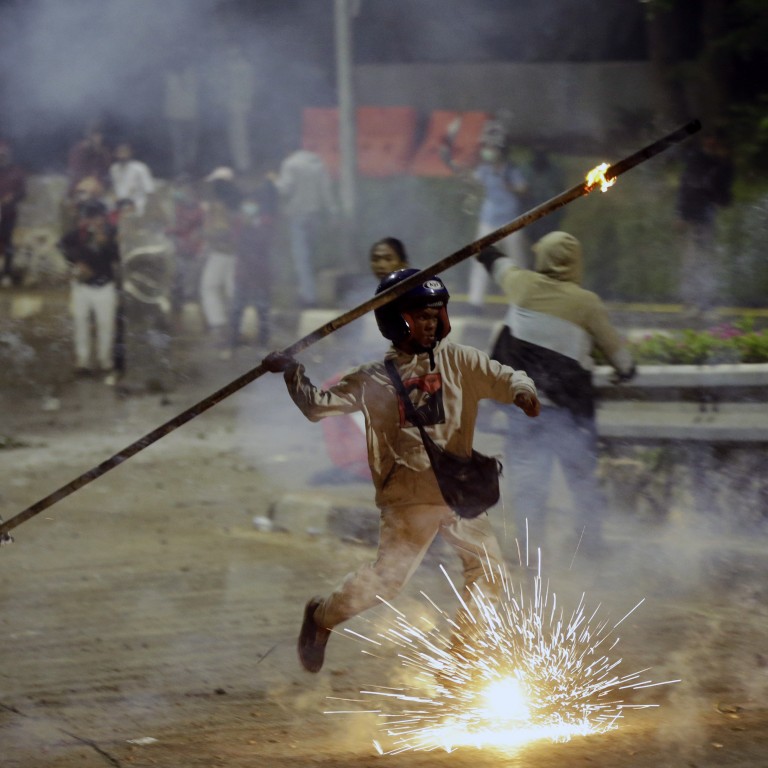
Mass protests in Hong Kong and Indonesia point to similar problems facing Carrie Lam and Joko Widodo
- In the face of protests, the leaders of Hong Kong and Indonesia have to maintain a precarious balance. Carrie Lam is caught between ‘one country’ and ‘two systems’, while Widodo needs to keep the secular right, religious right and liberal left onside
Like Hong Kong, Indonesia has recently witnessed the largest street protests in decades. There are telling similarities between the two outbursts.
How 4 million Hongkongers can help end the protest chaos
Perhaps there is a hidden hand in both crises. It is widely believed that the violent protesters in Hong Kong, unlike the peaceful majority of demonstrators, are working for shadowy forces whose identity may never be known. In Indonesia, clearly, Widodo represents a democratic threat to the political rise of Suharto-era personalities; he has frustrated those longing for iron political stability and unbridled profit.
That said, as in Hong Kong, political and economic grievances came together in Indonesia in a way that was difficult for the ruling elite to unravel.
This is because there are basic contradictions at work in both cases. Hong Kong Chief Executive Carrie Lam Cheng Yuet-ngor’s fundamental challenge is having to meet opposing demands under the “one country, two systems” formula. Given its national mandate, the Chinese leadership naturally focuses on the “one country” part.
However, given their desire for continued autonomy, disgruntled Hongkongers emphasise the non-negotiability of the “two systems” safeguard. Theoretically, it should not be impossible to balance the two demands. After all, the formula worked well at its inception and for many years thereafter. However, when “one country” rubs off on “two systems”, something has to give.
Since mainstream Hongkongers have been demanding neither greater autonomy nor the restoration of eroded freedoms – only the preservation of the rights that still exist – the onus falls squarely on China to honour the “two systems” principle even as it demands, legitimately, that Hong Kong stick firmly to the “one country” bottom line.
Hong Kong must respect ‘one country’ to keep ‘two systems’
Lam is caught in a vice. Her authority comes from Hong Kong but her power emanates from Beijing. China does not have to bear responsibility for, but exercises a silent veto on, her actions, whose impact is felt by Hongkongers, who can vent their rage only on her and her government.
The contradictions are less acute in Indonesia but they are present.
Widodo presides over an uneasy ideological coalition among the liberal left, which demands pro-people economic reform and political space for freedom of thought and expression; the secular right consisting of redeemed members of the ancien regime who support the interests of corporate Indonesia and laws that privilege political stability; and the religious right, which is economically and politically conservative but which makes its support conditional on the extent of Islamisation of the country.
The liberal left and the religious right represent mass forces; the secular right signifies the military-bureaucratic-business nexus that was powerful under Suharto until mass forces – primarily the liberal left but without opposition from the religious right – overthrew him and put the nexus on the defensive.
The appeal of Joko Widodo – president, everyman
Just as Lam cannot alienate either China or Hong Kong, although they both possess the ability to destroy her, Widodo’s problem is that he cannot let go of any of the three contending constituencies, although both the liberal left and the religious right could make his presidency untenable and the secular right could subvert his rule from within.
The best he can hope for is to have two of the three forces on his side. The danger is that he will be forced to choose a combination of the secular right and the religious right to keep his grip on both palace and street politics. The liberal left might fall by the wayside.
Those who wish Hong Kong and Indonesia well will hope that their leaders strive, with all their political might, to uphold the popular democratic impulses that legitimise their authority and justify their power. They could fail, but they must not give up without a fight.
Derwin Pereira is founder and CEO of Pereira International, a Singapore-based political consultancy. He is also a member of Harvard University’s Belfer Centre for Science and International Affairs

